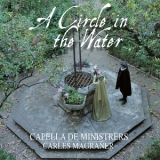 A Circle in the Water; Werke von Tobias Hume, William Corkine, John Dowland u.a.; Capella de Ministrers; 1 CD Capellea de Ministrers CDM 1947: Aufnahme 2019, Veröffentlichung 11/2019 (63'54') - Rezension von Norbert Tischer
A Circle in the Water; Werke von Tobias Hume, William Corkine, John Dowland u.a.; Capella de Ministrers; 1 CD Capellea de Ministrers CDM 1947: Aufnahme 2019, Veröffentlichung 11/2019 (63'54') - Rezension von Norbert Tischer
Diese großartige Aufnahme präsentiert Musik aus dem 16. Jahrhundert, u.a. von Tobias Hume und John Dowland. Das Ensemble Capella de Ministrers mit der Sopranistin Delia Agundez, dem Gambisten Carlos Magraner und Robert Cases an der Laute bez. der Theorbe hat die Melancholie zum zentralen Thema dieser Aufnahme gemacht, ausgehend von Robert Burtons zu Beginn des Chiaroscuro- Jahrhunderts veröffentlichtem Werk The Anatomy of Melancholy (1621). In dieser Schrift wird die Melancholie zum ersten Mal als grundlegender Aspekt der mystischen Erfahrung dargestellt.
Diese CD ist gleichzeitig der Soundtrack des Films El cercle en l’aigua von Vicent Monsonis nach dem Stück La Estancia von Chema Cardena.
Die Capella der Ministrers musiziert mit einer Mischung aus Fantasie und Melancholie. Die Schönheit der Klangfarbe der Instrumente wird von der Sängerin transzendiert, die die Emotionen der Musik perfekt abbildet. So wird die Capella der Musik, in denen Emotionen eine große Rolle spielen, vollkommen gerecht.
This great recording presents music from the 16th century, by Tobias Hume, John Dowland and others. The Ensemble Capella de Ministrers with the soprano Delia Agundez, the gambist Carlos Magraner and Robert Cases on the lute and the theorbo has made melancholy the central theme of this recording, based on Robert Burton’s work The Anatomy of Melancholy (1621) published at the beginning of the Chiaroscuro century. In this book, melancholy is presented for the first time as a fundamental aspect of mystical experience.
This CD is also part of the soundtrack to the film El cercle en l’aigua by Vicent Monsonis, based on La Estancia by Chema Cardena.
Capella the Ministrers plays with a mixture of fantasy and melancholy, and the beauty of the instrumental timbre is transcended by the singer, who perfectly reproduces the emotions of the music. So the Capella’s eloquent and sensitive performances do full justice to the music in which emotions play an important role.






















